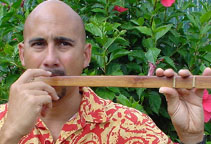

'Ukeke - The only stringed instrument indigenous to Hawaii (since the guitar came from Spain and the Ukulele from Portugal). Played with the mouth as a resonator and strummed with the hand. The 'ukeke shown here is made from Hawaiian koa wood (Acacia koa) and has three steel strings tuned to an A major triad (A, C#, E). In the olden days it was made from 'ulei wood (Osteomeles anthyllidifolia) while the strings were made from either olona (Touchardia latifolia), coconut woven string (sennit), horse hair or fishing line. Used in conjunction with love songs and chants its purest purpose was to convey aloha through its quiet gentle sound. Played in the evening when it was still and quiet. Mistakenly it was once branded by some missionary to be an "instrument of the devil." Story has it that two women were walking and conversing together while playing their 'ukeke. No one could understand what they were saying to each other except for the two musicians. The missionary upon hearing this sound was perplexed and confused and made an ethnocentric judgment on the instrument. The moral of the story is: "with all your getting get understanding."
Kimo Huybrechts was taught by the late master Hawaiian instrument builder kumu hula Lanakila Brandt of Kealakekua, Hawaii. Kumu Lanakila sent Kimo to do some research on the 'ukeke at the Bishop Museum in Honolulu back in the late 80's. Kimo carefully went through the audio "tape" archives and listened for the tuning, rhythm and style of which the 'ukeke was played. While no copies of recordings were permitted at the museum Kimo repeatedly listened to the recordings over and over until he had them memorized.
Today Kimo continues to make, perform and record with the 'ukeke and has taken the once unfairly "branded" instrument back in the church and demonstrated cultural understanding, sensitivity and appreciation. Kimo still looks to his Hawaiian elders for knowledge and accuracy of learning the 'ukeke. One such elder is Uncle Charles Maxwell of Maui, Hawaii.
![]() Back to Home
Page
Back to Home
Page
Copyright © Ranga Pae - All rights reserved